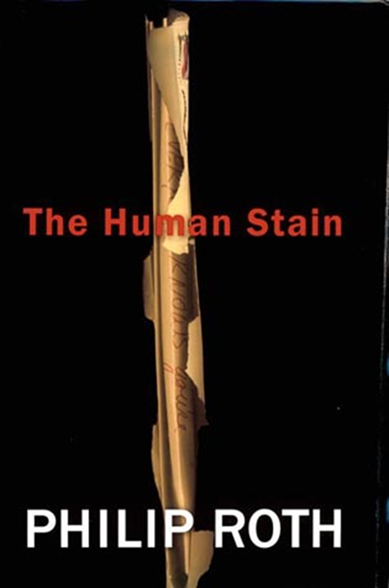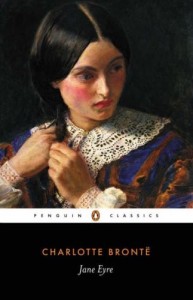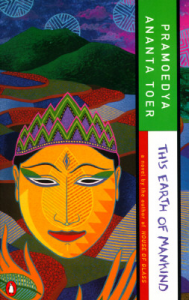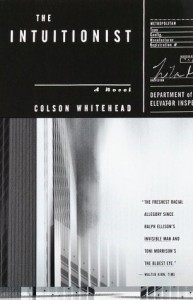Bertha Mason
Mason is also essential to moving the plot forward. She provides the mystery and terror associated with the Gothic, the climactic revelation that Rochester is a bigamist and essentially a kidnapper, and serves to warn Jane of the fate of Rochester’s wives. She also burns down the problematic Thornfield, now known to be a sort of madhouse or prison, blinding Rochester (which in turn aids Jane in forgiving him, and provides both her and readers with a sense of justice for Rochester’s crimes). She is a sacrificial animal, an interruption to surface-level appearances, which hold a madness of their own, and somewhat ironically, a guardian angel to Jane.
Annelies Mellema
Character: Annelis Mellma
Source Text: Toer, Pramoedya Ananta This Earth of Mankind
Entry Author: Mike Steigman
Annelies Mellema is the illegitimate daughter of Dutch settler, Herman Mellema, and Javanese (Indonesian) Concubine, Nyai Ontosoroh. She is the sister of Robert Suurhoff. Both he and Annelies are part Javanese, part Dutch or “Mixed-blood”, as referred to in the novel. Both Mr. Mellema and Nyai rushed to board a ship when she was in labor so Robert could be born a Dutch citizen, but to no avail.
Annelies’ introduction begins thus, “In front of us stood a girl, white-skinned, refined, European face, hair and eyes of a Native” (25). Her description is told through Minke, the protagonist’s perspective. Minke is Javanese, yet fluent in Dutch and Western studies thanks to his schooling. Annelies on the other hand stays home, assisting her mother in working the fields and raising animals.
She acts incredibly childish throughout the narrative, with all decisions imposed upon her. mother, love interest, father, doctor and brother all and forcibly make decisions for her. Her will is frail and she falls ill at the slightest touch, namely without Minke’s presence, continually drugged by the family doctor until Minke returns to her.
Once she wakes up from being drugged, the doctor tells Minke to “‘Have pity on this child. She cannot face violence or harshness. She dreams of someone who will love her, who will give her pure love. She feels like she is living alone, by herself, without knowing the world’” (202).
Considered the “better child” between herself, and her mixed brother Robert Mellema, she maintains the farm with her mother, Nyai. Robert Mellema had also dropped out of school and “for him there would be nothing greater than to become a European and for all Natives to bow down to him (67). He desires to pass as Dutch, but is unable to do so due to lack of education and his darker skin color. Annelies leans toward her Javanese identity based off her close relationship with her mother. Nyai has told her stories about how Herman Mellema had slowly turned an incredibly evil man after Nyai had attempted to educate herself to be fluent in Dutch and Western studies. Ever since, Nyai has decided to keep Annelies out of schools. Coupled with Robert Mellema sexually assaulting her, Annelies wants nothing to do with her “Dutch” side of the family.
Before he and Nyai had met, Herman Mellema was married and had a son. His biological son visits and accuses him of having “committed a blood sin, a crime against blood” (99).
The text concludes with her forced departure from Java, being the illegitimate wife of the main character and the illegitimate daughter of Nyai in the eyes of Dutch law. The courts then decide to send her off to Europe. Once she exits the safe haven of her home, she leaves Nyai and the main character, the two natives or Dutch-educated “pure-bloods” alone in the house, newly confiscated by the government.
The first installment in the Buru Quartet, This Earth of Mankind was originally an oral story shared between Indonesian prisoners. When Pramoedya Ananta Toer transcribed the text to paper, he sought to ‘correct the accepted version of the history of the ride of Indonesian nationalism’ through Annelies, who embodies the frailty of the nation, the instability of relationships as a counterpart to Minke and Nyai, both pure-blood Natives well-versed in Dutch teachings yet rendered powerless.
Annelies’ weakness is a microcosm of the relationship between colonizer and colonized. As an involuntary ambassador of the tragic princess, the walking manifestation of the union between ‘civilization’ and ‘barbarism’, she is wiped out by the end of the novel. As she exits, any hope of reconciliation between the Natives and the Dutch is systematically erased.
Lila Mae Watson
Source Text: Whitehead, Colson. The Intuitionist. New York: Anchor Books, 2000. Print.
Entry Author: James Tyler
It is unclear at the outset as to whether Lila Mae Watson is half-black, or as to whether her skin tone enables her to obtain a greater form of acceptance from her white colleagues, or to “pass.” Colson Whitehead chooses to focus marginally on Lila Mae’s relations with her father, who was black and who taught her “white folks can turn on you any minute,” but little mention is made of her mother (Whitehead 23). Although it is made clear that they occupied the same house, when Lila Mae recalls her elevator repairman father showing her and her mother his uniform, it is never made clear as to whether her mother might have been half-black. Aesthetically, Lila Mae exemplifies a “mixed-race” paradigm by her acceptance within a political minority, “the Intuitionists.” Within this political minority, she holds the unique and isolated status as the only black woman “Intuitionist.”
Watson finds herself within a racial identity equation of James Fulton and Pompey, both African American characters who choose to “pass” within white society, although Fulton’s identity is not made clear until well into the novel’s climax. As such, Lila Mae leads a lonely existence in the dark, with few African American role models other than Pompey, who is a conformist, and who appeases the white community, because success as an elevator inspector will ensure a better life for his family. Lila Mae is more determined and more of an individual, even if she has the capacity to be self-centered. She remains focused in the face of obstacles, and openly questions her culpability in the failed elevator inspection, rightfully insistent that there is something more to this situation and embarking on a “quest” to uncover the details in relation to the accident, and, in effect, finds herself discovering more about her own racial identity in the process. Effectively, Colson Whitehead inserts Lila Mae within the context of one of the oldest literary traditions, the “Quest” narrative, a narrative also ascribed to Danny in Steinbeck’s Tortilla Flat and Lila Mae’s literary ancestor, Janie Mae Crawford, in Hurston’s Their Eyes Were Watching God.
On this “quest,” Lila Mae is undeterred and un-intimidated when thugs invade her apartment, when she uncovers the deception of Natchez’s, and certainly when Chancre’s cohorts kidnap her. Still, Watson is compliant to a degree. She calmly accepts her Inspectors Academy room, a converted janitor’s closet. She is excruciatingly polite, even when under pressure, and she dresses conservatively and neatly, clearly invested in not doing anything to offend the sensibilities of a predominately white environment, and fully aware of the significance of her role as a black woman elevator inspector. Like Conrad’s Jewel in Lord Jim, Lila Mae is objectified by those around her; but while Jewel is objectified in a conventional sense, Lila Mae is utilized shamelessly by the Intuitionists for political gain, as proof of their diverse credentials, in contrast with the more conservative Empiricists. Lila Mae is an invaluable political tool as the only female, black elevator inspector, who just happens to be an Intuitionist. As such, whether or not she is willing to admit it or assume kinship with Pompey, she, in effect, is “passing” to a degree, as well.This is where her resemblance to James Fulton, the figurative father of Intuitionism, is most crucial. Both Lila Mae and James Fulton emerge as essential to the novel’s message, and are intrinsically linked to the novel’s theme of social advancement in the context of identity politics. Both hail from a period in which the only African Americans allowed in the department store were employees, although Fulton had more direct experience. James Fulton, a light-skinned black man, plagued by the necessity of “passing” racially, singles out Lila Mae Watson out in his private journals for a significant role within the Intuitionists. This leads one to wonder exactly to what degree he empathized with Lila Mae Watson. “He notices he has written Lila Mae is the one in the margins of his notebook,” Whitehead writes. “That’s right… She doesn’t know what she’s in for, he thinks, dismissing her from his mind” (Whitehead 253).
Coleman Silk
 Character: Coleman Silk
Character: Coleman Silk
Source Text: Roth, Philip. The Human Stain. Boston: Houghton Mifflin, 2000. Print.
Entry Author: Claire McDonald
Silk’s hidden identity is important to The Human Stain because it reveals an important aspect of the confines of freedom at this point in time. Silk can only obtain the freedom to live his life as he chooses if he is willing to give up his identity as a black man; this shows the institutionalized racism present in academia during the mid-20th century. His choice to pass as white also presents an interesting look at the definition of freedom. After being told that Silk lived his life as a white Jewish man, Zuckerman wonders if Silk’s choice to pass is the ultimate example of American individualism. By this, he means that Silk has completely prioritized his own success over the well-being of anyone else, including his mother, siblings, wife, and children. Roth essentially uses race to convey conflicting definitions of freedom and personal choice as they relate to the general sense of morality present in the U.S. at this moment in history.



